Part 1: Palestinian Revolution and Militant Cinema
In the late 1960s, revolutionary movements and struggles took place in various parts of the world. Filmmakers across the globe who sympathized with the Palestinian Revolution (that can be traced back to the 1930s under the British Mandate) produced works of “militant cinema“ in the 1970s and 80s, eight of which will be screened in this program. Furthermore, two additional works (created between 1990 and the 2010s) that give insight into the time period will be screened as well.
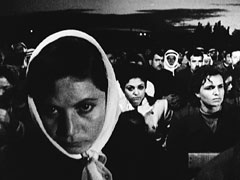 Fatah: Palestine
Fatah: Palestine
- ITALY / 1970 / Italian / B&W / Digital File (Original: 16mm) / 80 min
Director, Photography: Luigi Perelli
Editing: Cleofe Conversi
Writing Credits: Romano Ledda
Voice-over: Riccardo Cucciolla, Sandra Dal Sasso, Anna Maria Gherardi, Nico Rienzi, Stefano Satta Flores
Music: Vittorio Gelmetti
Production Company: Unitelefilm
In Cooperation with: Archivio Audiovisivo del Movimento Operaio e Democratico
This film is a television documentary tracing the origins of the Palestinian revolution and armed struggle. Focusing on the Palestinian National Liberation Movement (Fatah), it addresses the early phase of the movement (1967–70), emphasizing work carried out by revolutionary cadre to inspire a mass movement amongst the Palestinian refugee population. The film mobilizes its own call to arms by combining empowering images of militancy with accounts of political strategy and moral rationale.
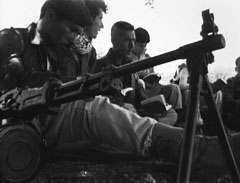 The Red Army / PFLP: Declaration of World War
The Red Army / PFLP: Declaration of World War
(Sekigun PFLP Sekai senso sengen)- JAPAN / 1971 / Japanese / Color / Digital File (Original: 16mm) / 71 min
Director: Adachi Masao
Editing: The Japanese Red Army, PFLP
Production Company: Wakamatsu Productions
A “newsreel” film, directed by Adachi Masao with Wakamatsu Koji for the World Revolution movement. A work of avant-garde propaganda calling for armed struggle demanding the liberation of oppressed peoples: we see footage from the hijacking of a Japan Airlines aircraft by the Japanese Red Army and the Pan Am aircraft bombing by the PFLP, scenes of Palestinian fighters training and the exchanging of messages addressed to the “Revolutionary People,” with slogan intertitles scattered throughout. This film did not show in theaters, but was toured around the country, to be screened in places like universities and factories.
* Following the film, there will be a talk featuring Adachi Masao and Mohanad Yaqubi, director of Off Frame aka Revolution until Victory.
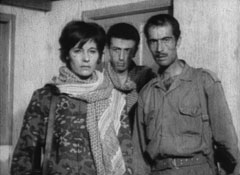 One Hundred Faces for a Single Day
One Hundred Faces for a Single Day
- LEBANON / 1971 / French, Arabic / B&W / Digital File (Original: 16mm) / 65 min
Director: Christian Ghazi
Script: Christian Ghazi, Rafeeq Hajar
Photography: Yousef Antar
Editing: Qais Zubeidi
Cast: Mouna Wasef, Houda Rami, Rimoun Jbara, Salah El Deen Mkhalalati, Mishleen Daou, Nadeem Suleiman
An avant-garde depiction of young people who throw themselves into the Palestinian liberation struggle, and bourgeoisie and intellectuals going about their world-weary lives—all against the backdrop of the daily agony of Palestinians who have been driven off their land. At the time, the film's unfamiliar style was criticized for undermining the movement for liberation, and it was filed away out of sight. In recent years, the work has once again attracted attention as an experimental political film.
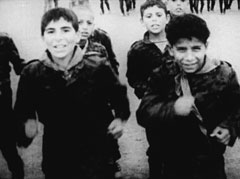 Revolution until Victory aka We Are the Palestinian People
Revolution until Victory aka We Are the Palestinian People
- USA / 1973 / English / B&W / Digital File (Original: 16mm) / 52 min
Directors: Pacific Newsreel
This film is regarded as the only Maoist film to be produced in the US about Palestine in the 1970s. It was fashioned wholly from stock material, drawn from documentaries, news reels, and archives. Aimed at a US audience, it offers an ambitious Marxist-Leninist reading of the entire history of Zionist colonization and Palestinian resistance. And this film is unusual for attending closely to the relationship between Zionism and the Holocaust.
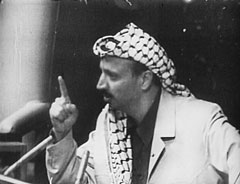 Kufur Shuba
Kufur Shuba
- IRAQ, LEBANON / 1975 / Arabic / B&W / 16mm / 36 min
Director, Editing: Samir Nimr
Photography: Mouteeh Ibrahim, Omar Al-Moukhtar, Samir Nimr
Sound: Riyad Abdallah
Distribution: Palestinian Cinema Institute
In 1972, Israel invaded Kufur Shuba, located in southern Lebanon, but ultimately withdrew due to the resistance of Palestine liberation movement fighters. In the 1974 United Nations general assembly, the PLO (Palestine Liberation Organization) was officially recognized as Palestine’s representative. This film consists of PLO Chairperson Arafat’s speech at the UN, interviews with freedom fighters (fedayeen), and shots from student demonstrations protesting the occupation by Israel. All of this coming together serves to extol the legitimacy of the Palestinian liberation movement.
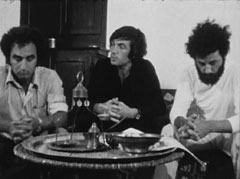 L’Olivier
L’Olivier
- FRANCE / 1976 / French, English, Arabic, Hebrew / Color, B&W / Digital file (Original: 16mm) / 83 min
Directors: Groupe Cinema Vincennes (Ali Akika, Guy Chapoullie, Danièle Dubroux, Serge Le Péron, Jean Narboni, Dominique Villain)
Sound Mixing: Michel Commo
Documents: Visnews, Newsreel, ORTF, Cinémathèque Palestienne
Composition: Mustafa Al-Kurd
L’Olivier was a response to a concern that French public support for the Palestinian cause was diminishing in the wake of the 1972 Munich attack. Structured so as to chronicle the Palestinian story and explain the current chapter in the liberation struggle, the film called for global militant solidarities and particularly for European political engagements.
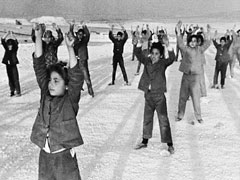 Here and Elsewhere
Here and Elsewhere
Ici et ailleurs- FRANCE / 1976 / French, Arabic, German / Color / Blu-ray / 55 min
Directors: Jean-Luc Godard, Anne-Marie Miéville, Jean-Pierre Gorin (original 1970 footage)
Photography: William Lubtchansky, Armand Marco (original 1970 footage)
Editing: Anne-Marie Miéville
Music: Jean Schwarz
Producers: Jean-Luc Godard, Anne-Marie Miéville, Jean-Pierre Rassam
Production Companies: Gaumont, Sonimage, Institut National de l'Audiovisuel
This film was completed in 1976 by Godard and Miéville, using unedited footage relating to the Palestinian Revolutionary struggle taken in 1970 by the Dziga Vertov Group, of which they had been a part. The film is shown from two perspectives: one from the actual location where the Palestinian Revolution is progressing in 1970, and one from the living room of a French family who is watching television in 1975. By equally arranging sounds and images and presenting them repeatedly, it reflects in cinematic terms on the gap between “sound/image presented there” and “what it means.”
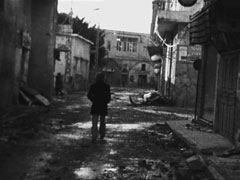 The Fifth War
The Fifth War
- GERMANY, IRAQ / 1980 / English / Color / Digital File (Original: 16mm) / 65 min
Directors: Monica Maurer, Samir Nimr
Photography: Tawfik Musa, Samir Nimr, Edward Al Qash, Mohamed Awad
Editing: Mauro Contini Sound: Hussein Younes, Shahir Soumi
Music: Huseyin M. Nazeq
Sound Mixing: Fausto Ancillai
Appearance: Vanessa Redgrave
Production Companies: Palestinian Cinema Institute, Samed for Cinema Production
In Cooperation with: Archivio Audiovisivo del Movimento Operaio e Democratico
Details the 1978 “Operation Litani” in which Israel invaded South Lebanon, aiming to eradicate the PLO’s base of operations. Vanessa Redgrave tells of how severely Palestine has been subjugated by war caused by imperialism, with resistance the result. Combat scenes benefit from unrivalled access and proximity—tragically two cameramen were killed in the making of the film.
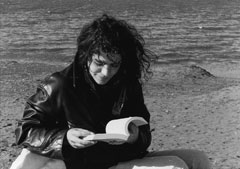 Genet in Shatilah
Genet in Shatilah
Genet à Chatilah- SWITZERLAND / 1999 / French, Arabic, English / Color / DVD (Original: 35mm) / 98 min
Director, Executive Producer: Richard Dindo
Photography: Ned Burgess
Editing: Richard Dindo, Rainer M. Trinkler, Georg Janett
Sound, Mixing: Henri Maïkoff, Roberto Ceschi
Music: Wolfgang Amadeus Mozart
Assistant: Sabine Sidawi Hamdan
Producers: Robert Boner, Richard Copans
Cast: Mounia Raoui, Leila Shahid
Production Companies: Lea Produktion GmbH, Les Films d’Ici
This work depicts French novelist Jean Genet and his connection to the Palestinian Revolution. Genet visits the Shatila refugee camp directly following the September 1982 genocide. He wrote about it in a work of reportage titled Four Hours in Shatila (1983), going on to spend the last years of his life pondering Palestine as he battled cancer, writing his final work, Prisoner of Love (1986), which was published posthumously from his manuscripts. Using quotations from both, lead actress Mounia Raoui traces Genet’s footsteps in his later years. American filmmaker Robert Kramer narrates the English version.
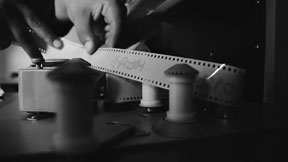 Off Frame aka Revolution until Victory
Off Frame aka Revolution until Victory
- PALESTINE, FRANCE, QATAR, LEBANON / 2016 / Arabic, English, French, Italian / Color, B&W / Digital File / 62 min
Director: Mohanad Yaqubi
Script: Reem Shilleh, Mohanad Yaqubi
Photography: Sami Said, Rami Nihawi, Sara Sea
Editing: David Osit, Ramzi Hazboun
Sound: Sami Said, Rami Nihawi, Andrej Bako
Sound Editor: Petru Sipos
Sound Design, Mixing: Carl Svensson
Producers: Sami Said, Mohanad Yaqubi
Production Company, Source: Idioms Film
Off Frame is a meditation on the Palestinian people’s struggle to produce an image and self-representation on their own terms in the 1960s and 1970s, with the establishment of the Palestine Film Unit as part of the PLO. Unearthing films stored in archives across the world after unprecedented research and access, the film begins with popular representation of modern Palestine and traces the works of militant filmmakers in reclaiming images and narrative through revolutionary and militant cinema. In resurrecting a forgotten memory of struggle, Off Frame reanimates what is within the frame, but also weaves a critical reflection by looking for what is outside it, “off frame.”
Sources: Archivio Audiovisivo del Movimento Operaio e Democratico (AAMOD), Masao Adachi Screening Committee, Dichard Dindo, Idioms Film, Serge Le Péron, Monica Maurer, Mermaid Films, Mitsui Mineo, Nadi Lekol El Nas, Jocelyne Saab, Subversive Film
